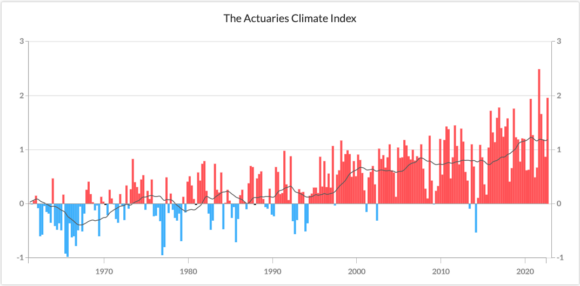Nearly every other American believes that people in the U.S. are being harmed by global warming right now.
It may be a bit of a revelation that half of the nation believes climate change is here and now. What’s not new is that polling shows most people now agree with scientists who say the world is warming, thereby increasing the chances of extreme weather, and that warming is being driven largely by human activities.
The findings are presented in a poll out today from the Yale Program on Climate Change Communication.
The poll also shows that 68% of Americans either “strongly” or “somewhat” agree that wildfires have increased around the world because of global warming, and that a majority of Americans (56%) think extreme weather poses either a “high” or “moderate” risk to their community in the next 10 years.
The group of social scientists from Yale and the George Mason University Center for Climate Change Communication conducted a nationally representative web-based survey of 1,085 American adults from Dec. 2 to Dec. 12, 2022.
They also found:
- More than two-in-three Americans say the issue of global warming is either “extremely,” “very,” or “somewhat” important to them personally.
- More than half of (58%) understand that global warming is mostly human caused.
- 44% believe they will be harmed by global warming, 48% believe their family will be harmed and 50% think people in their community will be harmed.
- 70% think global warming is occurring.
- 47% agree with the statement “I have personally experienced the effects of global warming,” while 53% disagree.
Actuaries Index
Unlike the much-talked-about Consumer Price Index, which showed a continued (though very slight) slowing of inflation, a lesser-known index appears to bear some bad news.
The Actuaries Climate Index was recently updated through August 2022 to reflect a slight rise.
The index measures climate risks on the basis of extreme climate events and changes in sea level. It provides measures of specific and aggregate changes in climate extremes and sea level across Canada and the U.S. The index is based on an analysis of seasonal data from scientific sources for six index components collected since 1961.
A rise in the index, which is relative to an average score of 0 during the 1961-1990 reference period, reflects a rise in the occurrences of extreme climate events.
The five-year average rose slightly from the previous season.
It now sits at 1.19. An interactive map of North America shows the changes in extreme weather from 1960 to present. The index also contains graphics showing a breakdown in changes in cool and hot temperatures over time.

Greenpeace vs. VW
A German court this week dismissed a lawsuit brought by environmental groups against Volkswagen.
The groups, led by Greenpeace, argued the carmaker was violating their fundamental freedoms by producing vehicles that contribute to climate change, Reuters reported in an article on Insurance Journal.
The suit, which called on Volkswagen to tighten its carbon emission targets, may not be the last time the car maker hears from the plaintiffs.
“The last word on our climate lawsuits against Volkswagen was not spoken today,” Roland Hipp, one of the plaintiffs, said in a statement. “We are planning further legal steps and are confident that we can persuade Volkswagen to do more on climate protection by legal means.”
Volkswagen, which faces another hearing in Germany later this month in a suit by a farmer backed by Greenpeace who says vehicle emissions are running his land and threatening his livelihood, has argued that civil lawsuits against individual companies were not the right way to determine action on climate change, according to the Reuters article.
Ice Robot
A robot dropped underneath a massive ice shelf in Antarctica offered some unexpected findings, which may give scientists clues to better forecast sea level rise.
The robot was sent under the Thwaites shelf in West Antarctica, among the fastest melting ice shelves on the continent and part of a massive glacier, which if they were both to collapse, could lead to up to 2 feet of sea level rise.
Peter E.D. Davis, an oceanographer and part of the team studying the ice shelf, told the New York Times the research “is telling us a lot more about the processes that drive retreat on Thwaites.”
The NYT reported the researchers now known the shelf is melting less than called for in computer model estimates. However, they also found rapid melting occurring in unexpected places that extended up into the ice.
Thwaites already contributes roughly 4% to the rate of global sea level rise of about 1.5 inches per decade, and its retreat has accelerated in recent decades, according to the NYT article.
Past columns:
- California Climate Bills Requiring Broad Disclosures Have National Implications
- U.S. EPA Seeking to Focus on Climate Mitigation
- Activists Say They’ll Continue to Call out Liberty Mutual for Fossil Fuels
- NASA: U.S. Coastlines Could Experience a Foot of Sea Level Rise Within 30 Years
- Moody’s: Environmental Considerations Increasingly Pressuring Issuers’ Credit Profiles
Topics Climate Change
Was this article valuable?
Here are more articles you may enjoy.



 CFC Owners Said to Tap Banks for Sale, IPO of £5 Billion Insurer
CFC Owners Said to Tap Banks for Sale, IPO of £5 Billion Insurer  Viewpoint: Runoff Specialists Have Evolved Into Key Strategic Partners for Insurers
Viewpoint: Runoff Specialists Have Evolved Into Key Strategic Partners for Insurers  Jury Finds Johnson & Johnson Liable for Cancer in Latest Talc Trial
Jury Finds Johnson & Johnson Liable for Cancer in Latest Talc Trial  Insurance Broker Stocks Sink as AI App Sparks Disruption Fears
Insurance Broker Stocks Sink as AI App Sparks Disruption Fears 

